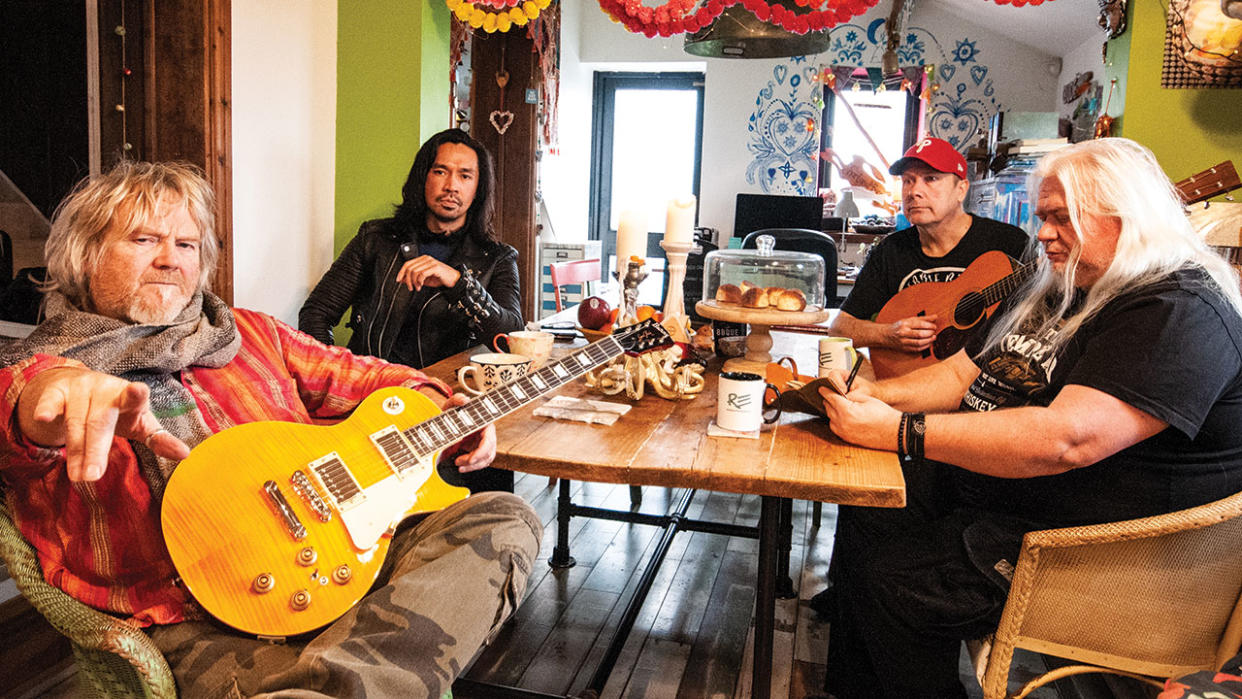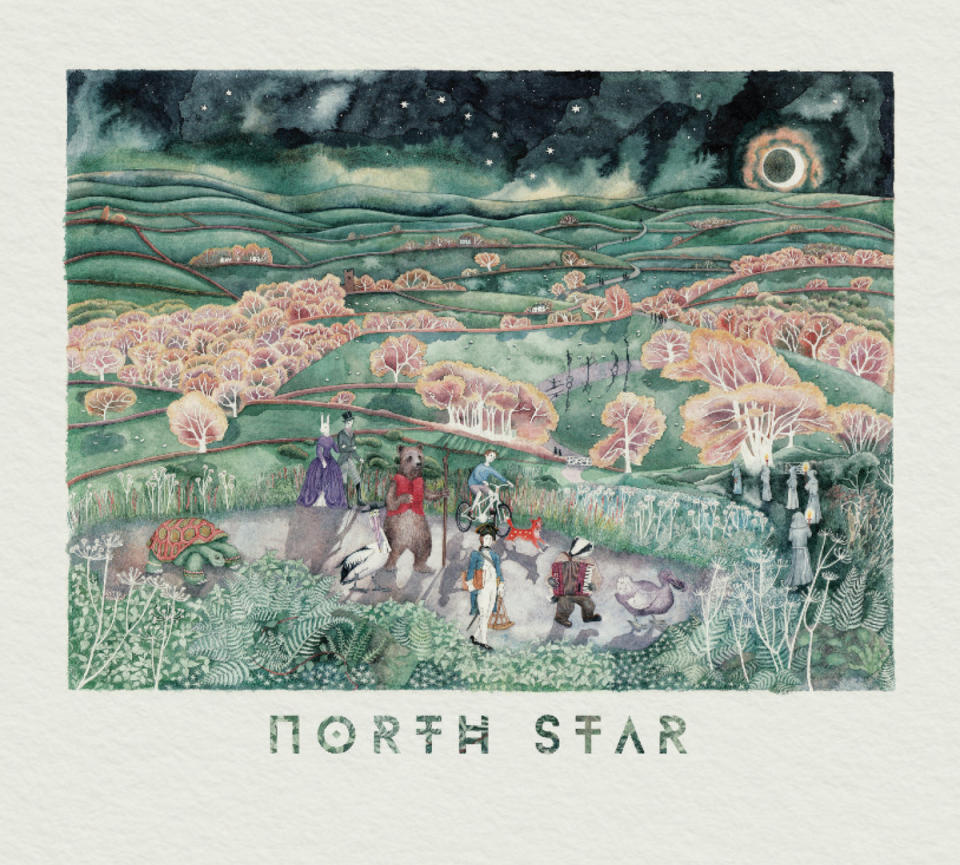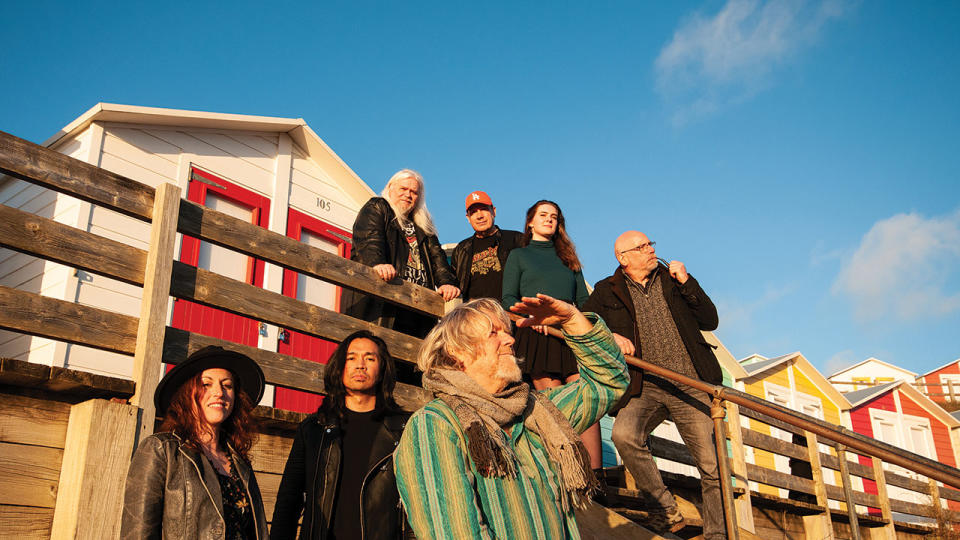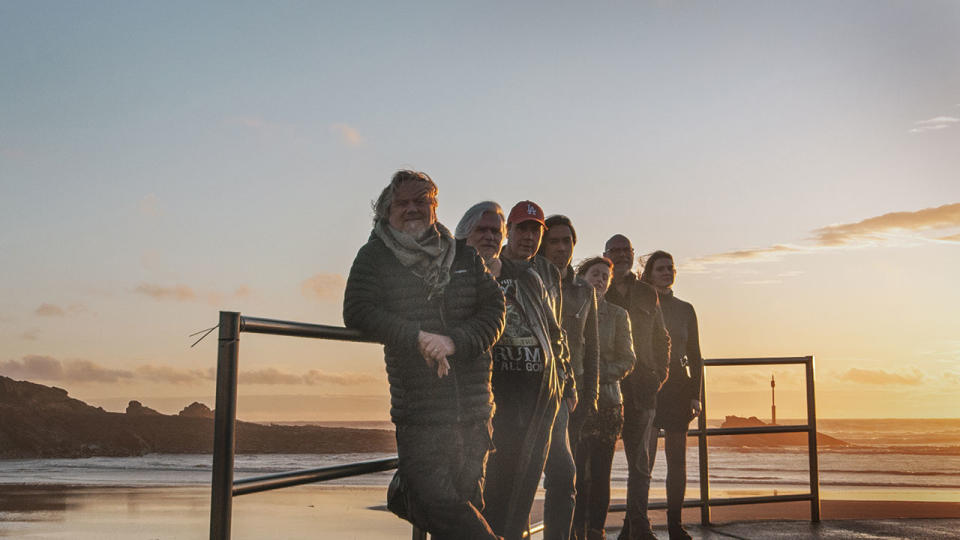"It was like falling off a log" - how Pendragon took on the pandemic. And won!

It’s easy to picture Pendragon’s Nick Barrett at work in his Cornwall home, curious cows peering over his garden fence and Barrett noodling with his guitar while gazing thoughtfully out to sea. It’s a serene setting that provides rather a sharp contrast with some of the hardships endured over the first 45 years of Pendragon’s career.
“For me, this is the icing on the cake, really,” concurs Barrett. “All the time we were sleeping in vans and struggling with trying to make a living. At times we were living in one-bedroomed accommodation, getting into debt and doing shitty jobs just to keep things going. But now I can get up in the morning, play my guitar and stare out looking out at the view of the sea. It’s just fantastic and I’ve always got a few songs going around. I still play a lot and I really love it more than ever.”
Those character-building days of musician hardship of Pendragon’s formative years have certainly been on Barrett’s mind over recent years. With their last album, Love Over Fear, released back in 2020 and touring restricted, the guitarist began writing an autobiography. Although it remains an ongoing project, he’s also in the tentative stages of forming new music for his band.
“I started writing a book on Pendragon and I decided to get through the early years before I forget them,” he reflects with a laugh. “There were so many funny little things that happened and stories from over the years: sleeping in a van and crashing on people’s floors and just trying to get somewhere with the band. So it’s a story of the impossible dream in a way that if you want to do anything you can. It’s got this message in there as well as the humour side as well.
“Everybody loves a hardship story, don’t they? So quite a lot of the initial period over the last three years was [spent] writing this book, but I’ve always got some music on the boil. The whole inability to tour was far from ideal. People are sometimes quite glib about this. They will say, ‘Well, if you can’t tour then you will just have to write another album.’ It is a bit like saying to a writer like Dan Brown, ‘Well, you’re just going to have to write another book then, aren’t you? It takes years and you need to kind of feel it. You need something to inspire you and then motivate you to get something going. I think with music it’s the same. You need something to be going in that direction.”

Pendragon’s music has remained alluring over recent releases, particularly judging from the positive reaction to 2020’s Love Over Fear. Aside from the quality, there’s also an element of timing that assists in creating a hubbub around an album. Yet even with the strength of their last LP, Barrett reveals that the success was a surprise.
“We get one record every so often which really sort of stands up and makes a big impact,” agrees Barrett. “Sometimes an album can just hit the right note with people. It has sold really well. It was probably our biggest-grossing album ever, which is pretty incredible after 45 years. You have got to bear in mind that the devil is in the detail here and that people have warmed to special editions and vinyl. They’re more expensive to make but are also how we managed to survive. We also made these books with artwork and also different versions of the album [released as limited-edition box set with artbook]. There was the album itself and there was an instrumental version. I wasn’t sure that an instrumental release was going to be a great thing but people liked the idea.
“Then we did an acoustic version [also released separately on vinyl last year], which had a lot of orchestration and the versions were quite different. So it wasn’t just a case of turning the fader down on the drums. It was a completely altered version of the album, with the arrangements being very different. That sold really well. People who are the real hardcore fans bought it and it meant that the album did extremely well for us. They needed to sell well too, because it covered our asses for the last three years.”

Keen to return to the live arena, the band investigated all possibilities as to how they could practically appear on stage. Thoughts were given to the usual standard multi-date European tour, which their loyal fans have perhaps come to expect over the last three decades. Yet times have palpably changed. Touring in the more traditional fashion has been financially stymied and stifled by constantly soaring costs, making it a tricky proposition even for a band of Pendragon’s stature. As Barrett rapidly discovered when investigating the practicalities, it became apparent such lengthy jaunts are currently not a feasible option.
“The first problem is that people are saying, ‘Covid is over, you can go back on tour’,” he considers, with an air of exasperation in his voice. “But I don’t think they’re quite understanding the full fall-out. An example is that we used to just jump on a bus and do 20 or 30 shows. It was like falling off a log and it was extremely easy. Now the cost of tour buses has gone up hugely. During Covid, borders closed and others had curfews. We were on tour when it was all going on and we had to cut shows. We would be sat in a lay-by on a tour bus just haemorrhaging money because we’re not getting the income. The concept of a string of shows on a tour bus has become very difficult. So, we came up with the idea of doing a Pendragon weekend, where we’re not going to be stuck in Slovakia for five days in a lay-by, with 16 people, who all need feeding and need to take a dump but with nowhere to go. I mean, we’ve managed for 45 years and the landscape has changed hundreds of times, so we hope that people will bear with us. We love doing it. We would love nothing more than just jumping on the tour bus and playing 30 shows. We would love to play in every corner of the world, but it’s simply cost and logistics.”
The idea of progressive bands arranging a live weekender isn’t a new one, of course. Marillion have been utilising the concept for the last 21 years, and other acts, such as Arjen Lucassen, have also enjoyed massive success with the idea. Seemingly though, it was financial pressures rather than an intention to imitate that led Pendragon to arrange a weekend at De Boerderij in the Netherlands, another in Morecambe in the UK, and a third at S?tre in Norway this May.
“We thought, if we do these, then it’s not such a [big] commitment,” he says. “By doing a weekend, the logistics are a lot easier. We’re trying to make it special by playing all of Love Over Fear on one night and performing all of Not Of This World on the other. We’re playing the latter because we weren’t able to do a 20th anniversary tour for that album. There will be a load of other music, an acoustic set plus a question and answer session.
“Some bands are charging a ridiculous amount of money for a quick handshake and a few questions, where fans could kiss goodbye to a couple of hundred quid. So we’ve decided to do it for everybody. We can sit on the edge of the stage, play an acoustic set, answer some questions and everyone can be a part of it. Hopefully that’s good value for money and it seems like a good thing to do. The obvious place to play would be London but I was thinking that would cost people an arm and a leg to park, to get a hotel, and everything else that goes with it. With Morecambe, there’s good transport links, you have got the sea and the Eric Morecambe statue. So, what’s not to love?”
There’s also a new mini-album, North Star, which is officially on sale at the weekends and will go on general release in June. Written over the last three years, in fits and starts, the process hasn’t exactly been the easiest as the guitarist reveals.
“I’ve always got a few songs on the boil and there are always two or three they I will sit down and play acoustic, usually for a couple of hours every morning,” says Barrett. “Normally something comes out of that and I started writing pretty quickly after Love Over Fear. I think the beginnings of North Star, which is the main song, started to formulate back then. There were moments when the writing stopped for a couple of months, and it can be like dragging a stone up a hill. A lot of musicians have this as sometimes you can just hit a block. You can leave it, pick it back up and you’re running with it again. It has been very much like that over the last three years.”

Musically, Pendragon have always retained an adventurous streak, dabbling in other
areas, but retaining a sound that remained identifiable. There was their classic neo-prog approach taken during the 80s, before the occasional poppier edge infiltrated their music. They also incorporated a metallic edge for albums such as Pure, and this time around, there are country influences that have crept in too.
“I’m still very hungry to hear people play and look at what they do and how they do it,” explains Barrett. “There are so many incredible musicians out there that a lifetime just isn’t enough time to hear what they’re all doing. I have come across people that I never thought that I would be listening to in a million years. Glen Campbell was a phenomenal guitarist. There’s a live version of By The Time I Get To Phoenix, which was recorded at the Troubadour in California, that’s an absolutely fantastic version of that song and the spirit is just incredible. His guitar playing is just amazing. He had a banjo player called Carl Jackson, who played using a country picking style. I learned how to do this and it’s like having another tool in the toolbox. Those things really pulled the music in a new direction. I was really happy that I had learned something new and that does come through in the music. I suppose it’s a hard one to say that country is progressive, because people think, ‘What the heck?’ But it depends how it’s done. I always like to bring in a few new things to the table without it being too disturbing in the melodic department.”
This article originally appeared in issue 140 of Prog Magazine.
